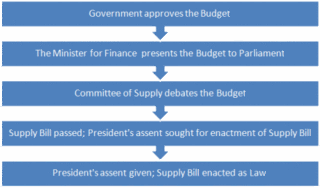The Singapore Budget is prepared for every financial year, which begins on 1st April of every year. For example, the 2010 Singapore Budget is for the period 1 April 2010 to 31 March 2011.
The Budget shows:
1. Approved expenditures and the usage of government funds of the past financial years; and
2. Planned government revenue and expenditures for the following financial year.
The annual budgeting process takes place in the following steps:

The Minister for Finance will present the Government-approved Budget to the Parliament before the new financial year begins. For Budget 2010, that will take place in February 2010. Members of Parliament will then ask questions on the past expenditure of the funds during the Budget Debate and Committee of Supply sessions. They will also debate on the proposed Budget for the following financial year.
Once the Parliament agrees with the proposed Budget, it will give its approval by passing the Supply Bill. The President will then need to give his assent to the Supply Bill to allow the Bill to come into effect.
If the President gives his assent to the Supply Bill, it is then enacted as law known as the Supply Act. The Supply Act controls the Government’s spending in the following financial year.
Singapore Budget 2010 Highlights

boost businesses. Package includes:
* S$5.1 billion on training and other measures to save
jobs.
* S$5.8 billion to stimulate bank lending.
* S$2.6 billion in grants and tax incentives to help firms
* S$2.6 billion to support families
* S$4.4 billion on infrastructure, education and health.
* 2009/2010 budget deficit to be 6 pct of GDP, before accounting for transfers.
* largest deficit to date.
* will fund S$4.9 billion of stimulus package by tapping government reserves.
* budget deficit for 2008/09 will be S$2.2 billion, or 0.8% of GDP.
* Overall budget deficit for 2009/10 will be S$8.7 billion, or 3.5 percent of GDP.
* cuts corporate income tax to 17 percent from 18 percent from Year of Assessment 2010, which will cost government S$400-S$500 million a year.
* one-time 20 percent rebate on personal income tax for Year of Assessment 2009.
* rules out cuts in employers’ contributions to Central Provident Fund.
* to create 18,000 public sector jobs over the next two years.
* to share risks for banks’ trade financing
* provide 40 percent property tax rebate for industrial and commercial properties for 2009 at cost of about S$800 million.
* government agencies JTC, HDB and SLA will provide 15 percent rental rebate to tenants.
* to defer property tax on land approved for development
* to improve cashflow of firms that want to defer projects.
* 30 percent rebate on road tax for goods vehicles, buses and taxis for one year.
* to provide support to banks to ensure S$11 billion worth of loans are available to companies this year.
* S$1 billion over next five years on sustainable development initiatives.
* grant for first-time home buyers raised to S$50,000 from S$40,000.
* tax deduction for charitable contributions raised to 250 percent from 200 percent.
For the complete budget speech, click here
No comments:
Post a Comment